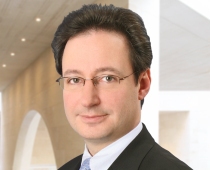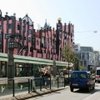Saxony-Anhalt is a centre for research in logistics

The energy efficiency laboratory of the Otto-von-Guericke University in Magdeburg is a gem of logistics research, because it is unique in German-speaking countries. Inaugurated in December 2010, it has over 800 storage yards for small parts. In a room measuring fifteen metres long, eight metres high and four metres wide, a situation is simulated just as it would happen in large warehouses. Yet the Magdeburg facilities go one better. Uninterrupted and in fine detail, it measures all energy consumption. Almost simultaneously with every movement, it measures what is consumed, when, where and by which action. The results obtained here can save a lot of money elsewhere.
In the energy efficiency laboratory, among other things, it is measured how much horizontal and vertical movements cost in terms of electricity. How much is saved with downward movement and with brakes. This is because when the operator unit, which stocks the shelves, brakes, energy is released. This can mean a reduction in the mains power supply of up to 50 % for horizontal movements and even of up to 60 % for vertical movements. It can be deduced from the result, for example, whether it is more effective to initially store low or high, more at the beginning or more at the end of a high shelf, says Professor Dr.-Ing. Hartmut Zadek, head of the Institute of Logistics and Material Handling Engineering at the Faculty of Engineering at Magdeburg University, describing the practical uses of this laboratory. His institute looks after the €250.000 energy efficiency laboratory which is financed by the Federal State of Saxony-Anhalt and the German Research Foundation, and which is used to train logistics students as well as for basic and applied research. The results of the research may be of particular interest for operators of large, high-rack facilities. Thus for example the Otto Group has been busy at its Haldensleben location with annual energy costs alone which run into the millions. The first round of tests in the laboratory indicated that energy could be recovered by up to 40%, reports Hartmut Zadek, who has a professorship in logistics at Magdeburg University.
It is no coincidence that this laboratory arose at Magdeburg University. Saxony-Anhalt is a centre logistics research. There is hardly any other university in Germany where there are so many professorships for logistics as in Magdeburg, says Zadek, who also works as a lecturer in other German universities. As well as his professorship, there are two further professorships at the Institute of Logistics and Material Handling Engineering. The professorship for logistical systems held by Prof. Michael Schenk deals above all with logistics-focused plant planning and operation as well as the modelling and simulation of sourcing, production and distribution networks. Furthermore, in personal union Prof. Schenk has been head of the Magdeburg Fraunhofer Institute for Factory Operation and Automation (IFF) for many years. Significant synergies in teaching and research have arisen from this, highlights Zadek. The 1.800 m² testing and development laboratory for RFID for radio frequency identification systems located at the IFF, researches and develops the complete monitoring of transport routes through innovative radio and video based location tracking technology. The Virtual Development and Training Centre (VDTC) of the IFF is located at Magdeburg Science Port. According to Zadek, it will be specialised in the newest Virtual Reality Technologies for application in the industry. The third professorship at the Institute of Logistics and Material Handling held by Prof. Zadek deals with technology for handling materials. It is supervised by professors Klaus Richter and André Katterfeld. Furthermore the economists at Magdeburg University also devote themselves to research in logistics. The professorship for business administration at the Faculty of Economy deals with business decision problems across the whole field of production management and logistics management.
Zadek also refers to colleagues in Halle (Saale). At the Martin-Luther University in Halle-Wittenberg, Professor Christian Bierwirth and his team carry out research into production and logistic systems in industrial companies and service providers. Logistics subjects are also offered at the universities of Magdeburg Stendal, Harz, Merseburg and Anhalt-Köthen.
The Institute for Automation and Communication (Institut für Automation und Kommunikation, ifak) in Magdeburg plays a particularly central role. It is an independent institute of applied research financed by the Federal State of Saxony-Anhalt. It is committed in particular to the introduction of information and communication technology in automation technology. Under the leadership of Professor Ulrich Jumar a range of logistics related subjects are pursued, highlights Zadek.
This concentration of scientific skill and the intensive work of scientists on the topic of logistics is seen in the industry as a strength of Saxony-Anhalt. According to the director of Magdeburg port Karl-Heinz Erhardt, with the port and the waterway intersection to the north, the hub around Leipzig/Halle airport and the logistical science, the Federal State has three logistical advantages which are exceptionally beneficial. Toralf Weiße, head of the Leipzig-Halle logistics network, which wants to connect the workforces of the industry in the region and market the location worldwide, also sees the logistics research in Saxony-Anhalt as "wonderfully set up". He would like the projects that the scientists are working on to become more well-known in order to be able to transfer the results into practice more quickly.
Zadek sees this concentration of logistics research in Saxony-Anhalt less as a reflection on the growing logistics industry in the Federal State. In his opinion, the science brings numerous advantages that can be used in practice by companies. "Logistics research fuels the economy“, he highlights. "Decision-makers see that a lot is researched and developed here. So why shouldn't they invest here as well? “, he asks. This train of thought is already being understood, explains the 42-year-old scientist, hinting to current or planned investment by industry giants like Hermes in Haldensleben, as well as Rewe, Kühne & Nagel or Dachser in other areas. Zadek also highlights that the ample large surfaces available for investment in the Federal State are also advantageous for the Federal State as a logistics hub.
The scientist highlights the telematics laboratory as a central focus of current intensive work at the university, which will be completed this year. It should serve research as well as teaching. This laboratory should investigate how the flow of goods in the city can be connected intelligently, used to capacity and monitored dynamically. That corresponds with the development laboratory of the Saxony-Anhalt Gallileo test field, which was opened a year ago by Magdeburg University at the port. This ambitious project is highlighted expressly in the logistics concept report of the Federal State government. It is financed with several million euro. At its inauguration it was hailed as the sole development laboratory and test field for location tracking, navigation and communication in transport and logistics in Germany. According to Zadek, the latest satellite-supported applications for the transport and logistics industry, public transport, telematics and radio-based communication in the transport sector of companies are tested and further developed here. Long-term objectives include the networking of different technologies and for example, the creation of intelligent and environmentally-friendly transport systems for Saxony-Anhalt. The topic of sustainability in logistics is currently being reformulated at the Institute for Logistics and Material Handling Engineering. "Therefore the close connection of economic, environmental and social aspects is being investigated“, says Zadek. In logistics, the term "sustainability“ combines economic efficiency with the conservation of resources. People are therefore at the centre of consideration. Describing the direction this will take in the future, Zadek says: "If everything in a logistics centre is automated, that surely may not be the best solution“. Together with the German Federal Association of Logistics, a criteria catalogue is being drawn up which recommends what must already be taken into consideration in planning in order to ensure sustainability in logistics. This ranges from power generation to building materials, says Zadek. These many activities in the field of logistics research contribute to Magdeburg University further establishing itself as a skills centre for innovative transport and logistics systems, explains the logistics professor, whose institute works in close cooperation with such companies as Continental, Bosch, Volkswagen, and others.
According to Zadek, the close cooperation which the researchers have established with the regional capital should also contribute to this. Last year the city was one of five German cities to win a competition organised by the German Federal Ministry of Research which will award each of the cities one million euro over the next five years, which should be used to improve the cities' energy efficiency. The Magdeburg Association for Wirtschaftsservice (GWM) oversaw and coordinated this project. Among its more than 30 partners are also the Otto-von-Guericke-University, the Institute for Automation and Communication (ifak), the Fraunhofer Institute for Factory Operation and
Automation (IFF), Magdeburg Stendal University and the Max-Planck Institute for Dynamics of Complex Technical Systems. By the year 2020, through a variety of measures more than 50 percent of the entire energy needs (excluding transport) should be covered by renewable energy and refuse incineration. According to Zadek, in terms of transport a reduction in CO2 emissions of 21 percent should be achieved through a whole raft of measures and an innovative traffic management centre, in conjunction with considerably more efficient cars and a relative proportion of hybrid and electric vehicles. Overall, according to information supplied by the Fraunhofer Institute, by 2020 the CO2 emissions should be reduced by at least two thirds compared to 1990 and the final energy consumption should be reduced by 20 to 25 percent compared to 2007. It's not just the logistics researchers who have a lot of work to do.
Contact
Otto-von-Guericke-Universität Magdeburg
Institute for Logistics and Material Handling Engineering
Professorship for logistics
Univ.-Prof. Dr.-Ing. Hartmut Zadek
Tel. + 49 (0) 391 6718604
Fax: + 49 (0) 391 6712646
Email: zadek.ignore@ovgu.de

